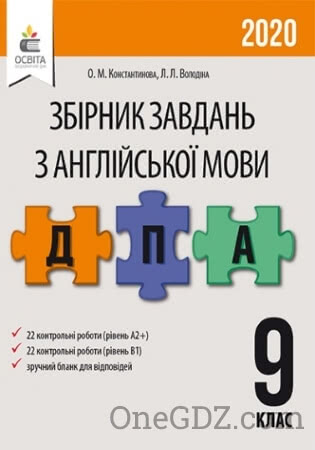
ДПА Англійська мова (Збірник завдань) 9 клас Константинова О.М., Володіна Л.Л. 2020 рік
ДПА 9 клас 2020
Test 11
Task 1. You will hear George talking on a radio programme about a trip he’s organising. Listen and mark the correct ending A, B or C for each sentence.
1. The adventure camp will last for
A a weekend.
B a week.
C the whole month of June.
2. George says that paintballing
A isn’t for everyone.
B can be uncomfortable.
C isn’t fun for him.
3. For people who don’t exercise a lot, George recommends
A yoga on the beach.
B zorbing.
C aqua aerobics.
4. Campers will stay in
A a tent.
B a hotel.
C a self-catering flat.
5. Teens can sign up for the trip by
A calling George.
B going to the community centre website.
C going to the community centre.
Task 2. Read the text and decide if the sentences are T (true), F (false) or NS (not stated)
1. Collecting baseball cards is a new favourite pastime only for children. FALSE
2. Some baseball cards are of great value. TRUE
3. The first baseball cards were printed at the end of the 20th century. FALSE
4. Honus Wagner’s card is sold in his hometown. NS
Task 3. Read the text. Choose one of the variants A, B, C or D.
Two men (1) A were travelling in a very wild part of America. They saw no modern houses and no traces of civilization for (2) C many days.
One day they met an old Indian who hunted animals. He was very (3) B clever and knew everything about the forest and the animals living in it. He could also (4) B speak English quite well.
“Can you tell us what the weather (5) A will be like during the next few days?” one of the two (6) B travellers asked him. “Oh, yes,” he said. “There will be snow for a day or two,but then the sunshine will come again and the weather will be fine.”
“These old Indians seem (7) C to know more about Nature (8) C than we with all our science,” said the man to his friend. Then he turned to the old Indian.
“Tell me,” he said, “how do you know all that?”
The Indian answered, “I heard it on the radio.”